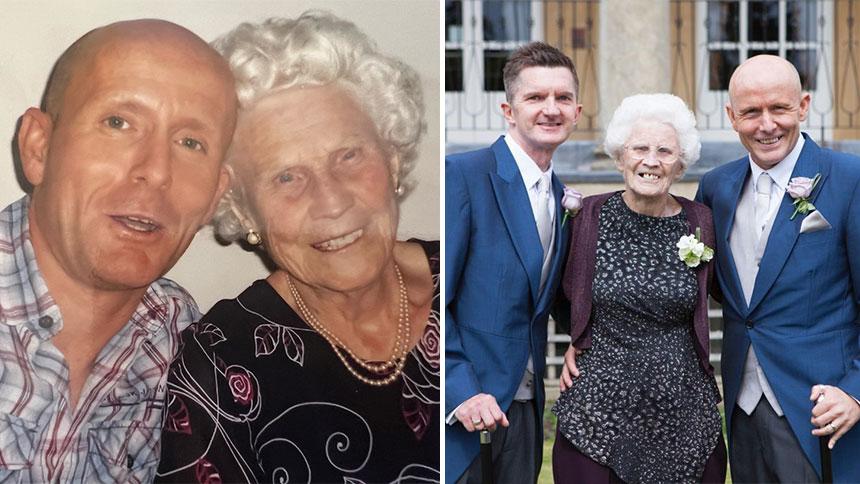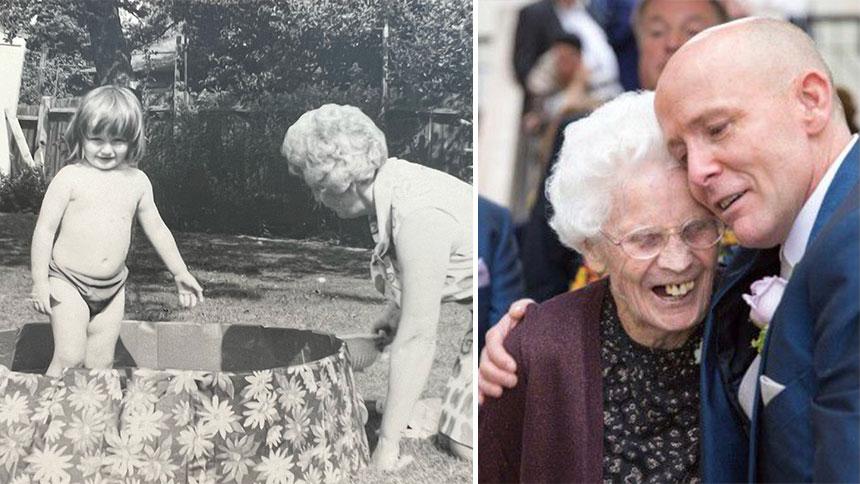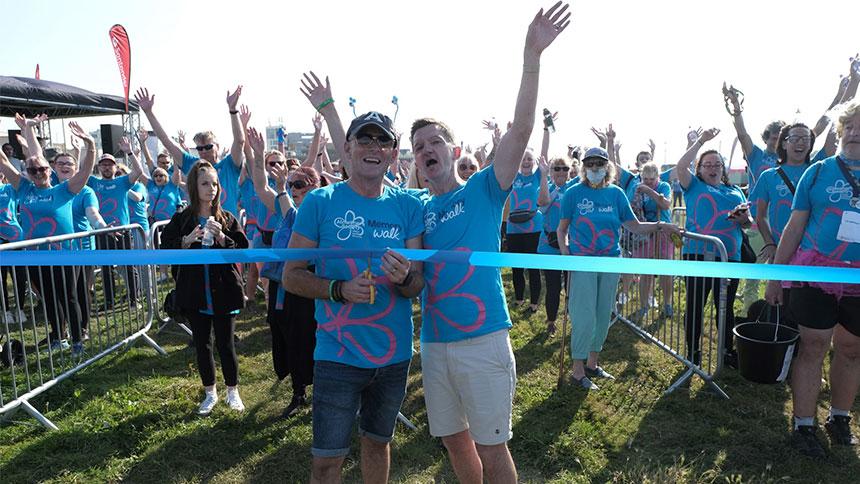Learning that you don’t need to deal with everything on your own when caring for someone with dementia
It took Jay Owen time to realise others were there to help with his nan’s care, and now he encourages other carers to reach out.
The day before his wedding, doctors broke the news to Jay that his beloved grandma Vera, known to everyone as Nanny V, had vascular dementia.
The rest of the family was on its way to join in the celebrations. So it was at the marriage venue itself that Jay had to break the news to his brother, sister and their mum, Vera’s daughter.
‘This was meant to be a happy day for all of us, but I struggled to find the right words to talk to them. It came to be quite a sad occasion,’ remembers Jay.
‘By the time I came back from honeymoon, Nanny V’s memory seemed to be in little bits and pieces. She’d been divorced from my grandad for years and he’d since died, but she kept saying, “Bill should be coming to collect me.”
‘She was reliving her past. It was so upsetting.’

A powerhouse
The changes in Vera were especially hard to take because she’d been a powerful, independent woman throughout her life. She was a teacher, then a headteacher, and an adventurer who travelled the world.
She had lived by herself for decades and was such a powerhouse, she’d chopped down the overgrown trees in her back garden herself. No need to bother with a tree surgeon, she decided.
Nanny V, now 98, played an important part in Jay’s childhood. As a teacher, she had school holidays, unlike their parents, so the three children spent a lot of time with her when they were growing up.
‘She was a little bit strict,’ says Jay. ‘Our other grandparents would take us to the park, but Nanny V would say, “Here’s some homework, try these sums.”
‘We did all right in the end with a little bit of help from her, and we loved hearing the stories about all her travels. We lived all these experiences through her.’
Sudden change
Even in her 90s, Nanny V did everything for herself. Then a fall at home led to a broken hip, and her confidence levels plummeted.
‘She stopped going out because she feared falling again,’ says Jay.
The family brought in carers to help. Vera clashed with them so, when the agency suddenly closed, Jay decided to care for Nanny V himself.
‘To start with, I’d come over in the morning, get her dressed and make her lunch but when I went to go home, she’d stand at the door saying, “Don’t go, don’t go.”
‘I started staying over with her one night, then two. At home Andrew and I were planning our wedding, but I was spending so much time with Nanny V. It wasn’t fair on him.’
Jay grew concerned that his nan was just sitting in a chair, no longer doing crosswords or sudoku. She repeatedly asked questions about what time and day it was.
Her stress levels led to frustration that she took out on him. He took her to the doctor who sent her for a memory test, and dementia was diagnosed.
Relentless pressure
Back from his honeymoon, Jay moved in with Nanny V, to take extra care.
‘When I went home, I’d argue with Andrew and that made me not want to go home anymore.’
With the pandemic, Jay created a ‘bubble’ with his grandmother instead of with his new husband.
‘I just thought I can’t leave her. I tried to flip back home at the weekends, but I was too scared that she might fall or leave taps running. I kept thinking, “I can do this by myself. I don’t need help from anyone.” But I did.’
Jay’s mother and his sister Tracey helped when they could. Tracey eventually made the decision to move close by so that she could take over the night shifts, from 7pm to 7am, while Jay continued with day shifts. However, Jay still found the pressure too great.
His nan had enjoyed going to day centres, but one had shut because of cutbacks, another because of COVID, though this one has now reopened one day a week.
‘I was so tired with all the shopping, washing and cleaning, and Nanny V would respond by being rude to me. It felt relentless. I was turning into a gibbering wreck.
‘Nan gets very frustrated. She throws things.’
Jay says it was ‘quite scary’ seeing her respond to things in ways you’d normally associate with a child.

Not alone
It was Andrew who suggested contacting Alzheimer’s Society.
‘I wasn’t sure what the charity could do, but Andrew went on the website and showed me.
‘I dreaded reading some of the stories on there, but the blogs taught me I wasn’t alone. Others were going through this too. It was such a relief to know this.
‘Then I rang Alzheimer’s Society and they really helped me. They told me when Nanny V was rude, it was just words. She has no filter anymore. They said, “It’s not your nan talking, it’s the condition inside.”’
Being a male carer isn’t always simple, says Jay. His nan’s generation believes it’s women’s work.
‘When I first helped her out of the shower she said, “Oh God, you’ve seen me naked. I bet you didn’t think you’d be doing this?” I said, “No, Nanny V, it wasn’t on my bucket list of things to do by the time I’m 50.” So we can still banter with each other.’
Giving back
Jay’s helped tremendously by his mum, who takes Nanny V to live with her some of the time, as well as Tracey and Andrew, but he’s committed to his caring role.
‘She’s my nan. I remember the vibrant person she was. As much as it disheartens me to see how she is now, I can’t let go. If it makes her feel better that I’m here, if I can keep her in her own home surrounded by the neighbours she’s known for so long, that’s what I’ll do.
‘But I can’t thank Alzheimer’s Society enough. They gave me the support. They said, “Bear with it, things will get better. Your nan might not get better, but we will make the situation better together.”
‘If I hadn’t spoken to them, I think I would have given up and I didn’t want to let Nanny V down. I want to give back to her some of what she gave to me.
‘It’s unbelievable the information that’s out there to support us. That’s why we did the Brighton Memory Walk for Alzheimer’s Society in September. Andrew and me even cut the ribbon at the start. I felt it was the least we could do to say thank you.
‘The support I had from the Alzheimer’s Society saved our marriage. We decided to get married because we wanted to spend our lives together. Of course, I loved my nan to bits, but she wasn’t part of my routine when we made that decision.
‘Then things just escalated, and I couldn’t walk away.’

Reach out
Jay says the toughest thing for him at the moment is being unable to get a face-to-face appointment with his nan’s GP to discuss her condition, but Jay’s advice to anyone in his position is to remember that there’s help available. No one should struggle by themselves.
‘There is always someone out there who will listen, help, guide and advise you through whatever your circumstances may be, from the simple sound of another human voice on a phone to chat forums on the internet,’ he says.
‘Please don’t suffer alone.’
Sadly, Nanny V died since we spoke to Jay for this article. He was keen to still share his story to make a difference to other people affected by dementia, for which we’re very grateful.
How can you help?
Your support ensures people won’t have to feel alone after a dementia diagnosis.


Margret
saysWhat are some of the "helps" I can discuss with my husband's doctor that would aid him in going to sleep better at night? He has vascular dementia.
Thanks for getting in touch, Margret. We’d always recommend contacting our Dementia Connect support line; it’s the best way to get tailored advice and dementia information specific to you and your husband’s situation. You can call them on 0333 150 3456 – more information, including opening hours, is available here: https://www.alzheimers.org.uk/dementia-connect-support-line
In the meantime, here are two webpages that should be useful:
- How to support someone with dementia to sleep better at night: https://www.alzheimers.org.uk/about-dementia/symptoms-and-diagnosis/hea…
- Sleep problems and treatments for people with dementia: https://www.alzheimers.org.uk/about-dementia/symptoms-and-diagnosis/sle…
Some sleep disorders in dementia may need help from a specialist, such as a consultant geriatrician or old age psychiatrist. The GP can refer the person to a specialist. This may take some time, so try to see the GP as soon as you can.
Sleep medication is not recommended for a person with dementia. However, some doctors may suggest trying it for a short period if the sleep problem is severe, and non-drug treatments have not worked.
If the person does take sleep medication, they may become more confused and more likely to fall over the next day. Take extra care with them.
All of this information is part of our factsheet called ‘Understanding sleep problems, night-time disturbance and dementia’ (Factsheet 534LP). You can download a digital copy (https://www.alzheimers.org.uk/sites/default/files/2021-03/534LP%20Under…) or you request a paper version in the post (https://www.alzheimers.org.uk/form/order-free-publications).
You may also benefit from joining our online community, Talking Point, where people affected by dementia can share their experiences and ask each other questions. You can browse topics being discussed within the community, or sign up for free to join the conversation: https://forum.alzheimers.org.uk
Lastly, you may also be interested in the IDEAL study's knowledge resources on sleep: https://livingwithdementiatoolkit.org.uk/stay-safe-and-well/a-good-nigh…
We hope this helps for now – and please do contact our support line advisers on 0333 150 3456 for further information.
Alzheimer's Society website team
Alan Eleanor
saysNot much help about what services are available is there?
Hi Alan, thanks for getting in touch.
We’d recommend contacting our dementia advisers, which Jay mentions, by ringing our support line.
Everyone’s situation is different, so having an initial conversation with an adviser on the phone is the best way to find out what’s available to you. They can give you information about local and national services, as well as other dementia advice and emotional support.
The number for our Dementia Connect support line is 0333 150 3456 and opening hours can be found here: https://www.alzheimers.org.uk/dementia-connect-support-line
Our support line is linked from the top of every webpage, but we have just added more obvious links within Jay’s article for clarity.
We hope this helps for now, and please do call 0333 150 3456 if you’re looking for any kind of support.
Alzheimer’s Society website team
Patricia Norma Allen
saysTHIS STORY IS REALLY REASURING. mY HUSBAND HAS MIXED DEMENTIA. AS A RETIRED NURSE I WOULD LIKE TO CARE FOR HIM MYSELF HE IS INCONTINANT WHICH I AM ABLE TO DEAL WITH AND HE DOESNT LIKE TO REMOVE HIS CLOTHES AT BEDTIME.SOMETIMES I GIVE UP AND HE GOES TO BED FULLY DRESSED. HE IS MAINLY CONFUSED IN THE MORNING AND EVENING BUT CAN BE HIMSELF IN THE MIDDLE OF THE DAY HE EATS VERY LITTLE AND IS LOOSING WEIGHT. THE LOCAL DEMENTIA GROUP OFFER HELP BUT I CAN'T SEE WHAT MORE THEY CAN DO. THEY DO RUN GROUPS AND ACTIVITIES BUT MY HUSBAND REFUSES TO ATTEND.
Tina Davis
saysAfternoon your so lucky to be living in the Uk we live in Spain where it's hard to get any help except I have found a company that with pay and it's not cheap will give me a few hours for myself.I have been a carer for my other half for five years..
Keith Stacey
saysIn no way do I want to play down the message in this helpful story. It is really important that people in this situation are aware of available help!
However, I do feel there is often a greater need by a husband or wife. To see a total change in one’s lifetime partner’s behaviour is even more distressing and confusing. Help is not to be ashamed of in any way. Alzheimer’s were wonderful to me (once I accepted the need)
Do it / it will really help.
Sylvia Budd
saysI agree that helping a beloved grandparent is very important but it is not the same as being the carer for your spouse when you have been together for a very long time. When you have been partners in everything it is very hard to find that your husband (of 48 years in my case) has absolutely no idea about much of daily living any more. At the age of 86 and physically disabled I now have to make all decisions and solve all problems 24/7. Yes, you can get advice from organisations like Alzheimers which is useful but you are still on your own when a problem or difficulty arises late at night.